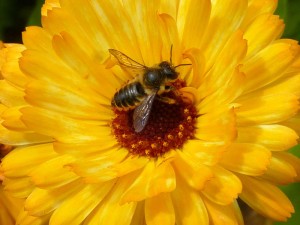Humans have always associated honeybees with honey which is the first sweetener ever produced. Now although some people know that the honeybee is also a pollinator, few realise just how much these hard-working insects contribute to our wellbeing.
Pollination
In the economy of nature, pollinators provide an important service to flowering plants. As the bees travel from blossom to blossom in search of nectar, they transfer pollen from plant to plant. This cross-fertilises the plants, enabling them to reproduce by bearing fruit or seeds and ensure that they can continue to multiply and survive thus contributing to biodiversity . The plants in return pay with food (nectar & pollen) for the pollinators and their offspring.
Apart from helping in our gardens and wildlife habitats, honeybees help farmers to produce more crops like almonds, blueberries, cherries, cranberries, plums, cucumbers, sunflowers and apples, Even crops like oil seed rape, principally wind-pollinated, gain a more even and reliable seed set from bee visits. They also help to pollinate the fruit and nut bearing plants and trees that wild birds and animals feed on.
There are many types of pollinating bees: Bumblebees, solitary bees and honeybees. But by far the most important are HONEYBEES.
Pollination and the environment
Flowering plants produce breathable oxygen by utilizing the carbon dioxide produced by plants and animals as they respire. There has been a rapid rise in carbon dioxide levels in the atmosphere in the last century due to increased burning of fossil fuels, destruction of meadows and vital forests, the earth’s lungs.
Pollinators are key to reproduction of wild plants in our fragmented global landscape. Without them, existing populations of plants would decline, even if soil, air, nutrients, and other life-sustaining elements were available.
Flowering plants help to purify water and prevent erosion through roots that holds the soil in place, and foliage that buffers the impact of rain as it falls to the earth. The water cycle depends on plants to return moisture to the atmosphere
Value of honeybee pollination
Approximately one-third of human food is derived from insect pollinated plants. Honeybees are responsible for a major part of this pollination and thus play a critical part in the human food chain. If we had a serious loss of honeybees in the UK, then we would have to import food from overseas and costs would go sky high!

To the UK agricultural economy pollination is worth more than £200m every year. The indirect retail value of what the honeybees pollinate is about £1 billion (meat, dairy products etc due to animal feeds.) The worldwide value of pollination is about £165 billion.
The greatest value of pollination is associated with the production of seeds that will have worldwide distribution.
But our pollinators are declining for many reasons!
The number of honeybees in the UK has halved in the last 25 years along with many beekeepers and their hives. Three quarters of all our butterflies and two thirds of moths have also seen population decreases since the 1970s.
A single hive of fifty thousand honeybees can pollinate half a million plants in one day. Without them there would be a severe knock-on effect on honey production and pollination. Honeybees also offer other special benefits as they produce wax and other products that are used in manufacturing, cosmetics and health aids.
It would not be easy to find an alternative method of pollination.




